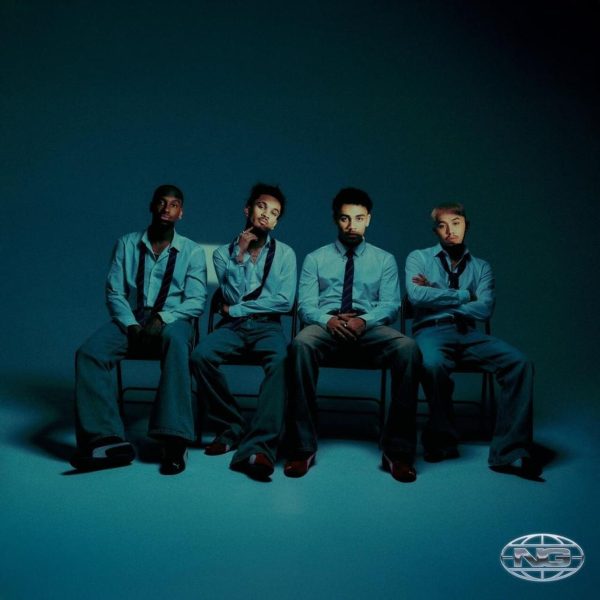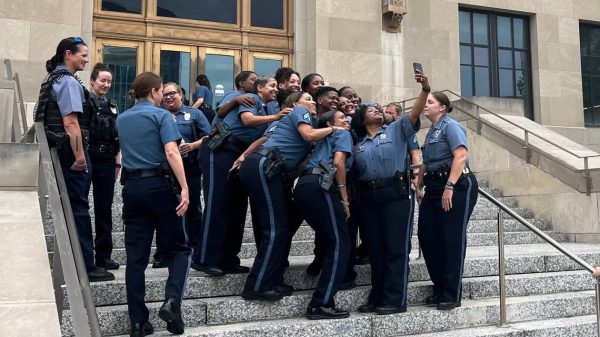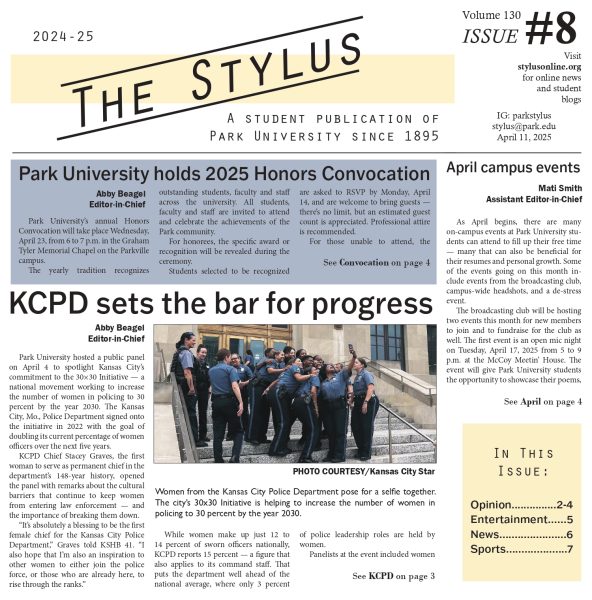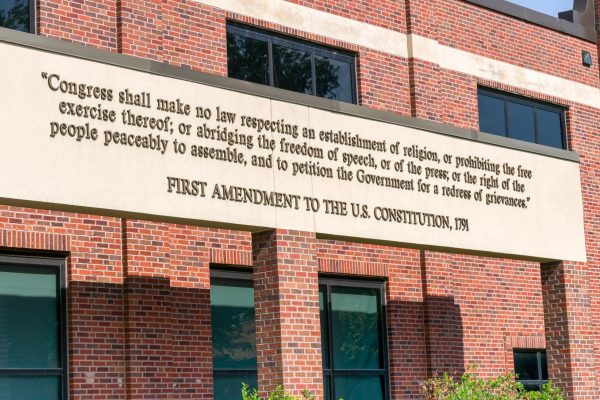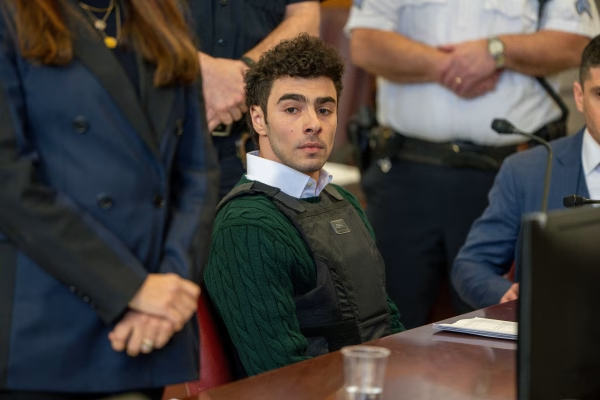Between two polar opposites, a Pakistani-American woman finds her footing in the American Dream
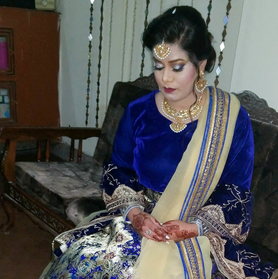
Zartasha Sani dressed in traditional Pakistani wedding attire before attending her friend’s wedding.
“I’ve been a black sheep within the Pakistani-American community and with my American friends,” said Zartasha Sani.
Sani, 24, is a senior Park University political science major who moved to the United States from Pakistan in 2003 when she was nine years old. Since the day she and her family immigrated to America, Sani has had to find a balance between her Islamic, Pakistani roots and her adopted American culture.
“There was a lot of things I wasn’t allowed to do,” Sani said, laughing. “You don’t have little girls – or even 24-year-old women – going to the movies or sleep overs (in Pakistan). A lot of your interaction is with your family.”
That can sound lonely to Americans. However, Sani explained how in Pakistan people live with their extended family.
“I was never really alone,” she said. “You don’t really feel the need to be like ‘can I go to a friend’s house?’”
“I wasn’t allowed to go to the movies alone until I was 18,” she said. “I couldn’t go to the movies at all until I was 14. From 14 to 18 my parents had to be with me. I had to see something that was PG – not even PG-13 – it had to be PG. It was so hard.”
Sani described a constant battle with two cultures pulling on her from opposite ends. She envisions her parents on one side pulling her to stay true to her Pakistani culture and American society pulling her in the other direction to assimilate.
“It’s hard to put into words sometimes what I’m about and what my beliefs are,” Sani said. “They don’t match up with one identity. I don’t eat halal but also don’t eat pork. I ‘break’ rules. For me it feels like I’m making my own way and making an identity for myself which is unique to my situation.”
Religious practices illustrate how she is navigating her personal identity. Sani is Muslim. She used the constitution as a metaphor for how she interprets the Qur’an. Some people believe that it should be followed word for word and literally, while others treat it like a living document that can change to reflect the times. Sani is one of the later.
Religion shouldn’t be used to restrict someone’s life, it should be used as a lifestyle guide, Sani said.
“The reason I am still a religious person is partly because of my family,” she said. “Another part is that I want to have faith in something… It’s nice to belong to a faith, it’s nice to have something to believe in; it’s nice to have cultures and traditions.”
Sani said that despite what she likes about religion, a thing that she doesn’t like is how it can often be a tool to further a group of people’s political stances. It can be used to discriminate against people that are different than them.
“No matter who you are, where you come from or what you do, you shouldn’t be discriminated against because of someone else’s religion or someone else’s political beliefs,” she said.
As a Muslim woman, Sani has chosen to dress modestly, but has decided that “modesty” would mean what she wants it to mean instead of what other Muslims tell her it should mean. She also doesn’t drink, despite spending a few years being a bartender.
But many years before Sani was picking out her own clothes or pouring a customer a drink, she was a child coming to the United States for the first time. Immigrating here with her family was not an easy feat.
Sani moved to the United States with her mother Shamim Sani, father Naeem Sani and younger sister Fatima Sani. She also has a younger brother, Mohammad Sani, who was born after they moved to the United States.
“One of the biggest reasons we moved here was because of my sister,” Sani said. “She was born with a cleft palate. She has autism and several mental disabilities. She’s 22, but she doesn’t talk. The left part of her brain didn’t develop fully.”
Despite being 22, Sani’s younger sister Fatima looks to the unknowing eye of strangers like she is only seven years old. She weighs only 105 pounds and stands 4’5” tall. Her mental capacity is approximately that of a two-year-old.
Both Dubai, where the Sani family lived before the U.S., and Pakistan aren’t as medically advanced as the United States. This was especially true in the late 90s and early 2000s before Dubai turned into the booming city it is known to be today. At the time, the Sani family was told that Fatima’s life would be short. Naeem Sani decided that wasn’t going to be the end of his second daughter’s story.
When the two girls were young, the Sani family took a trip to Washington, D.C., to visit family. It was then that they took Fatima to Boston University to see if they could get more answers on what they could do to improve her life.
Fatima was roughly two or three, as Sani recalls. She had spent her entire life eating through a feeding tube placed in her abdomen. The medical team at Boston University told the Sani’s that they could reconstruct her palate, which would allow her to eat and breathe normally, but it would require them moving to the United States.
After that trip, Naeem Sani held on to the idea of moving to the United States after his military contract was finished, and that’s exactly what he did.
Then the family began the whirlwind citizenship process. They moved to Kansas City on the back of Naeem Sani’s workers visa. Nearly two decades later in 2018 the entire Sani family became citizens.
The Sani’s were a special case. Worker’s permits typically only allow for the person with the permit to come to the United States. However, since Fatima needed medical treatment, the entire family was allowed to go with Naeem Sani.
Once they all got to Kansas City, they moved in with extended family. The four of them shared a single bedroom in a two bedroom apartment.
Both daughters were enrolled in school, and Fatima got her medical care from Kansas City’s Children’s Mercy Hospital.
“Any person she meets, she makes them smile,” Sani said.
She said her family dynamic would be impossible without her little sister. Without her sister, and her dad’s determination to make her sister’s life better, Sani would still be in Pakistan.
“If I was still in Pakistan,” she said, “I’d be married with three kids by now, not in college.”
Inspired by her journey from Pakistani child to adult Pakistani-American citizen, Sani is planning to go to law school to become an immigration lawyer after graduating from Park University.
Your donation will support the student journalists of Park University. Your contribution will allow us to cover our annual website hosting costs, freeing up other funds for equipment, printing and training.



